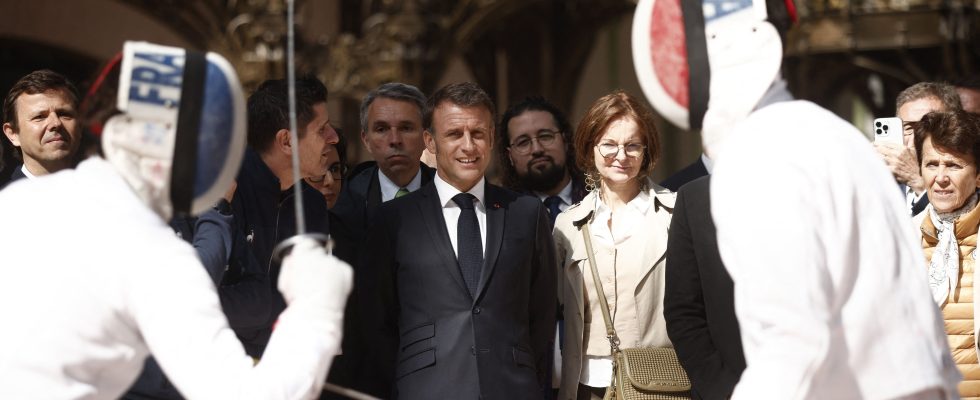100 days before the opening ceremony, the organization of the Paris Olympic Games appears to be a real race against time. Will the parade take place on the Seine in the event of a terrorist threat? Will the show be continued? Will the Olympic sites be sufficiently secure? What about public transport? At the microphone of France Info, Wednesday April 17, the Minister of Sports, Amélie Oudéa-Castéra, assures us: “France will be there.” And insists: “We will be ready.” However, uncertainties and gray areas persist.
Emergency No. 1: agreeing on the opening ceremony
First, around the opening ceremony of the Olympic Games, which will take place on July 26. As a reminder, the initial plan provides for a river route on the Seine, with sports delegations which will parade over 6 kilometers. While the organizers have been ensuring for several months that no other option is being considered, Emmanuel Macron spoke at the start of the week about different scenarios in the event of a terrorist threat.
Questioned on BFMTV, Monday April 15, the President of the Republic indeed affirmed that “plans B and even plans C” were being studied. The Trocadéro is among the options considered. “Repatriate the ceremony to the Stade de France”, also. Which, on the other hand, would amount to drawing a line under a festive ceremony. An “uneducated” hypothesis, an advisor to the president put it into perspective a posteriori.
The fact remains that in the event of an “absolute catastrophe” on “D-3” of the Olympics, the executive would fall back on “a strictly protocolary ceremony”, confirmed the Minister of Sports on Wednesday, while reassuring: for the moment, “no specific terrorist threat against the Games” has been identified.
Emergency No. 2: secure the path of the flame
This does not, however, prevent us from anticipating possible disruptions. The torch relay, launched Tuesday April 16 in Olympia, Greece, is the subject of increased vigilance on the part of the organizers of the Paris Games. In 2008, a few days before the Beijing Olympics, pro-Tibet demonstrators heckled the torch bearers passing through the French capital. Scenes of chaos, which the executive hopes this time to avoid.
To do this, the tenant of Beauvau has provided a “security bubble around the torch bearer(s). This will be made up of “18 police officers and gendarmes in civilian clothes”, supported by “a convoy of some 115 internal security forces”, as well as by “mobile force units [qui] will be present at the front and at the back” of the procession, said the Minister of Sports. “Alternative routes” have been drawn up in the event of difficulties.
Emergency No. 3: increase the number of security agents
If she reiterated that no specific terrorist threat weighed on the Games, Amélie Oudéa-Castéra nevertheless conceded that “zero risk does not exist [ait] not”. Even more so at a time when the Vigipirate plan is at its highest level. To guarantee the safety of the festivities, and in order to support the police, the organizing committee and the State have concluded numerous contracts with private security organizations. The government also claims to have increased the objectives “in order to compensate for the problem. no-show“, or the fact of not showing up for work on the agreed day.
“We work a lot with the France Travail teams to ensure that all those who arrive in the sector [de sécurité] can be allocated as a priority to companies which are awarded contracts from the organizing committee”, argued Amélie Oudéa-Castéra. And to specify that “10,000 recruitments are already secured”. However, far from the daily need, estimated at “18 000 private security agents on the ground.
Emergency No. 4: put line 14 into circulation
Since the announcement of the Games, residents of the Ile-de-France region have feared congestion on public transport during the events. 123 days before the opening ceremony, the president of the Ile-de-France region, Valérie Pécresse, called for “collective intelligence”. And caused an outcry by declaring: “You shouldn’t be afraid to do a little walking, it’s good for your health.”
On France Info, Wednesday, the Minister of Sports tried to reassure Parisians: “We are there in terms of transport. […] The RATP, the SNCF, all the players will be ready.” Amélie Oudéa-Castéra particularly drew attention to the upcoming arrival of line 14 extended to Orly airport (Val-de-Marne), in the south, and as far as Saint-Denis-Pleyel (Seine-Saint-Denis), in the north On March 27, the boss of the RATP, Jean Castex, was optimistic: “We are running, it is. a marathon. But we are on schedule.”
A real-time map of the Ile-de-France transport weather has also been put online by the Ministry of Transport. The Anticiperlesjeux.gouv.fr site allows you to “see what is going to be congested, at what time, to possibly modify your itinerary, adjust your departure or arrival time, or start teleworking in agreement with your employer”, a argues Amélie Oudéa-Castéra.
Emergency No. 5: make the Seine swimmable
A question remains on everyone’s lips: will we be able to swim in the Seine this summer? Here again, the Head of State assures him: “We will be there, but there are things on which we will be there just on July 26.” And added: “We spent more than 1 billion euros of public money on wastewater treatment plants, with filtering stations, with the reduction of what was dumped into the Seine and the Marne of undue manner. And that’s very important to me, because it’s not just for a dive or for a few events.”
Way to calm concerns after the samples taken in the Seine by the NGO Surfrider Foundation which indicate the presence of bacteria at levels which exceed the standards set by the International Swimming Federation. However, more is needed to discourage Emmanuel Macron: “I have not changed my mind.” The President of the Republic’s dip in the Seine is still relevant today.
